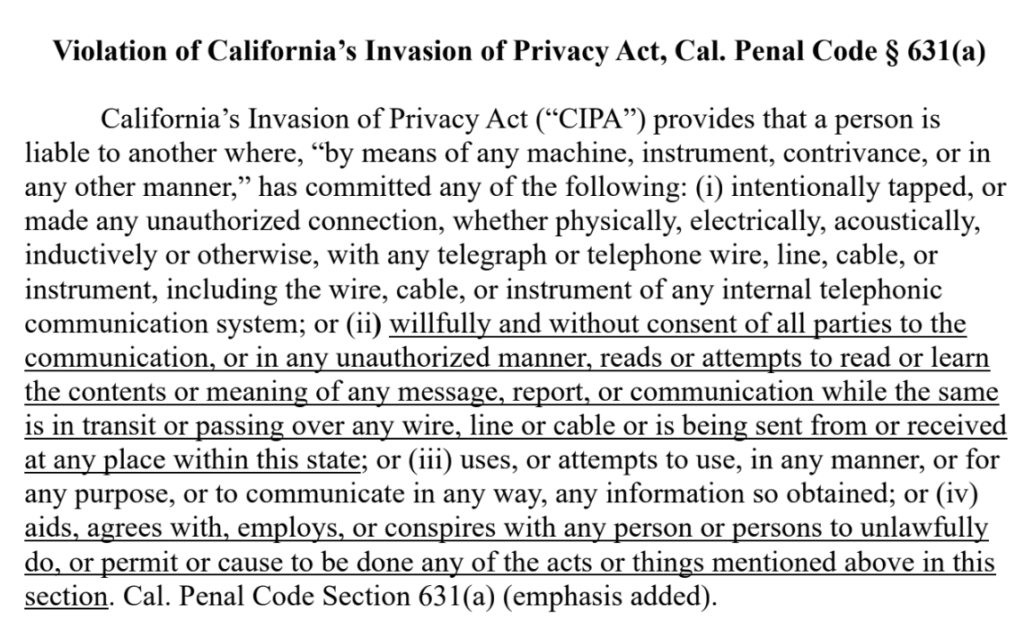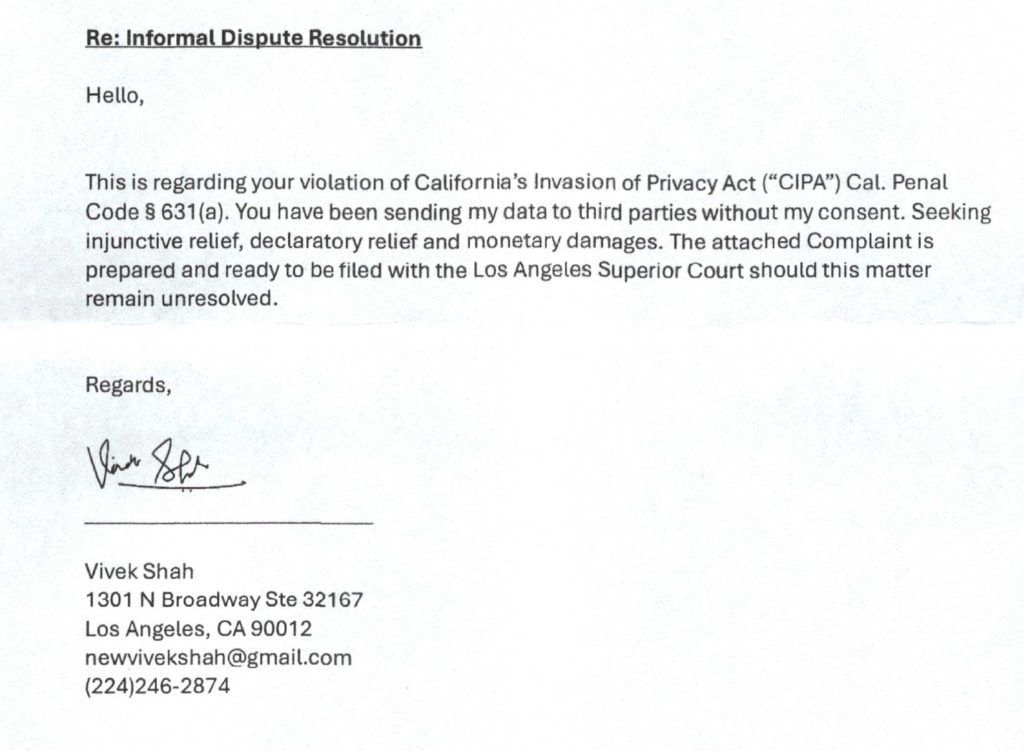If you’ve received a demand from Vivek Shah don’t be worried. There are hundreds of businesses receiving these each week and we can help you fix your website so that you’re compliant by standing up our industry leading data privacy software and we can help work towards a dismissal. Book a time below with our International Association of Privacy Professional Sam:

Schedule a 15-minute Demo with a Data Privacy Expert
The landscape of website privacy litigation in California is rapidly evolving, posing an urgent risk to companies that have not implemented a robust, all-party consent mechanism. At the forefront of this new wave of exposure is the rise of private right of action claims for privacy violations. Recent filings and demand letters sent from a Vivek Shah, a prominent “serial litigant” whose name is now synonymous with private right of action lawsuits filed under the California Invasion of Privacy Act (CIPA).
For corporate privacy leads and legal counsel, the pre-litigation demand letters, often titled “Violation of California’s Invasion of Privacy Act, Cal. Penal Code § 631(a)”, are a critical warning. While these may not yet be filed complaints, they signal a systematic and sophisticated effort to target businesses, particularly those operating without a functional cookie consent mechanism.
Below is an example of the document that Shah’s violation notice opens up with showcasing the violation of CIPA Cal Penal Code 631:

The CIPA § 631(a) “Wiretapping” Theory
The core of the legal threat stems from CIPA § 631(a), which prohibits the unauthorized interception of confidential communications—an outdated wiretapping statute being aggressively applied to modern web technology. If a business is using Captain Compliance’s consent management software they are able to avoid these expensive litigation cases but those who have not signed up yet are at risk of legal threats not just from Vivek but other plaintiffs firms.
The Theory of Violation in Private Right of Action CIPA Claims:
The argument, successfully advanced by firms working on behalf of plaintiffs like Shah, is that a website violates CIPA when it uses third-party tracking tools (such as Meta Pixel, Google Analytics, or session replay scripts) to collect and transmit user data.
- Confidential Communication: A user’s activities on a website (clicks, searches, form fills) are characterized as a confidential electronic communication.
- Unauthorized Interception: The embedding of a third-party tracker allows the vendor (the third party) to secretly “eavesdrop” on this communication in transit, violating CIPA’s all-party consent rule.
This litigation strategy is gaining traction, backed by plaintiff’s firms like Tauler Smith and Vivek Shah, which are filing legitimate claims. Defendants who choose to litigate these cases without a strong consent defense are facing adverse rulings and significant statutory exposure of $5,000 per violation. The underlying issue in these losses is a simple failure in fundamental compliance: the absence of proper privacy software and notification.
Shah’s History: A Pattern of Litigation
Vivek Shah’s focus on privacy violations is part of a broader, well-documented history as a litigant in areas of digital law, demonstrating his persistent and active engagement with intellectual property and personal rights claims.
- Copyright and DMCA Litigation: Prior to his focus on CIPA, Shah was involved in notable lawsuits concerning copyright infringement and the Digital Millennium Copyright Act (DMCA). For example, he sued media outlets over the use of photographs taken of him at Hollywood parties.
- Focus on Authorship: The central legal question in those cases was who held the copyright to a photograph when Shah composed the image and owned the camera, but a bystander pressed the shutter button. His claims often failed due to the court finding he could not prove sole or joint authorship, nor did he have standing for a DMCA claim without copyright ownership.
This background illustrates that Shah is an informed and active litigant, making the recent flood of CIPA demand letters a serious operational risk, not merely a boilerplate nuisance. He also is asking for $50,000 in statutory damages in every letter he sends out along with other fees, costs, and relief.

In his legal letters and subsequent draft complaints, Vivek Shah asserts that your website and company is operatung a “digital wiretap” via its website’s search bar. He alleges that this practice violates the California Invasion of Privacy Act (CIPA), specifically California Penal Code § 631(a).
Below is a breakdown of his primary privacy claims that we’re seeing from clients that have not had their sites properly protected with the Captain Compliance software and thus one of the reasons why they received one of these lawsuits:
1. Unauthorized “In Transit” Interception
Shah claims that when a user types a query into the website’s search bar, the data is not just sent to your website. Instead, hidden third-party tracking scripts (from entities like AdRoll, LinkedIn, and HubSpot) simultaneously “read and copy” the content of the search while it is still in transit.
-
Contemporaneous Capture: He argues this is a “real-time” interception rather than subsequent data sharing, making it the functional equivalent of a physical wiretap on a phone line.
-
Search Terms as “Contents”: He asserts that search queries (e.g., his search for “VIVEK”) represent the “substance, purport, or meaning” of a communication, which classifies them as protected “contents” under CIPA rather than mere metadata like an IP address.
2. Failure of Consent and “Deceptive Design”
Shah alleges that the website’s privacy protections are legally defective and misleading.
-
Lack of Prior Consent: He argues CIPA requires prior express consent before any interception begins. He claims the tracking code fires the moment a user arrives, before they can even interact with a cookie banner.
-
Disregard for “Decline”: In his specific test on a recent complaint we read, Shah clicked the “Decline” button on the cookie banner. He claims the website ignored this refusal and continued to transmit his search data to third parties regardless.
3. Aiding and Abetting Third-Party “Eavesdroppers”
As the website owner, he says that your business is a party to the communication. Under California law, a party generally cannot “wiretap” their own conversation. Shah bypasses this by claiming:
-
Third-Party Interlopers: The tracking entities (Google, Meta, etc.) are “uninvited interlopers” and not parties to the communication.
-
Corporate Culpability: By choosing to embed this code for its own commercial benefit, “aids, agrees with, employs, or conspires with“ these third parties to commit the unlawful interception.
4. Statutory Damages and Injunctive Relief
Shah is seeking a high-stakes resolution based on the following claims he is sending out to your registered agents:
-
Per-Violation Damages: He requests $5,000 for each violation. He argues that every search query sent to a distinct tracking entity (e.g., one search sent to four different trackers) constitutes multiple independent violations.
-
No Proof of Injury Needed: He points to CIPA § 637.2(c), which states that a plaintiff does not need to suffer actual monetary loss to bring a claim; the invasion of privacy itself is the harm.
-
Mandatory Dismantling: He is asking the court for a permanent injunction to force the company to “dismantle and remove” the surveillance scripts.
How To Respond to the Vivek Shah Search Bar Lawsuit?
While most of the complaints filed in Los Angeles, County California courts are the same there are some nuances. We ask that you send to us the formal compliant and court case filed by Shah and we can help with remediating the website and getting you compliant to avoid future issues and if you have counsel we can work with them to get a proper response and the case dismissed.

The Captain Compliance Solution: Mitigating CIPA Risk
The vulnerability highlighted by these lawsuits is preventable. The losses sustained by defendants who fight and lose these claims are often due to a lack of defensible, auditable consent protocols.
For companies seeking to neutralize this litigation risk, the most effective defense is a demonstrably compliant and legally sound consent framework. Solutions that automate the deployment of a legally sound cookie banner and integrate with third-party tracking technologies to ensure no data is collected until all necessary consent is secured are essential and you’re able to set it up this way with a Captain Compliance banner.
By failing to adopt and properly configure a comprehensive privacy compliance platform, businesses expose themselves to an ever-growing threat landscape, where repeat litigants like Vivek Shah stand ready to exploit the statutory damages provisions of California law. Investing in a robust platform is now a necessary cost of doing business online, protecting against statutory damages that can quickly escalate into multi-million dollar liabilities.
The message for privacy counsel is clear: relying on a non-compliant or absent consent mechanism is a losing strategy that cannot withstand the scrutiny of modern digital privacy litigation. Proper privacy software and notifications are the only legitimate defense.
Book a demo and get a free privacy audit for your clients or your business today and see how we can help you.